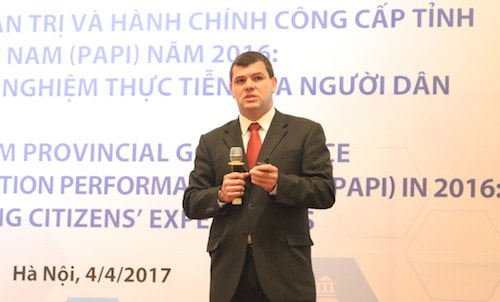54% of people 'have to pay bribes to get a job in the public sector'
The proportion of respondents who said they needed to pay a bribe to get a job in the public sector increased from 46% in 2011 to 54% in 2016.
According to the 2016 Vietnam Provincial Governance and Public Administration Performance Index (PAPI), released on April 4, k54% of respondents said that it is necessary to pay bribes to get a job in the state sector.This rate is higher than 51% in 2015 and 46% in 2011.
PAPI reports areMr. Dang Hoang Giang, Center for Community Development and Support Research (Cecodes) presented,The 2016 Public Sector Corruption Control Index showed a downward trend. The proportion of people reporting that they had to pay bribes to public officials to obtain land use rights certificates continued to increase over the past year.
In addition, the situation of extortion in the public sector is increasingly common, while the determination of people to report corruption and extortion by state officials is "stable" at a low level. Only about 3% of those who are harassed or asked for bribes have reported it.
"People's tolerance for bribery continues to increase. Those who are bribed tend not to report it if the amount is less than VND25.6 million, higher than the average level of the 2015 survey (VND23.7 million)," said Mr. Giang.
 |
Mr. Kamal Malhotra, United Nations Resident Coordinator in Vietnam, spoke at the launching ceremony.. |
According to Mr. Giang, the results of the nationwide survey reflect that the current situation of favoritism in recruiting human resources in the public sector is becoming increasingly serious, along with that.The goal of “fairness in public sector recruitment” is considered very difficult to achieve.
From the survey results, the PAPI report makes recommendations that authorities at all levels need toPrevent officials and civil servants from taking advantage of their positions and powers for personal gain through acts such as: extortion when carrying out administrative procedures, using public funds for personal purposes and accepting "bribes" when recruiting personnel into the public sector.
“The 2016 PAPI survey results present a mixed picture. On the one hand, public service delivery has improved steadily over the past six years. On the other hand, most provinces could have done better to improve the capacity and attitudes of civil servants and public employees; and increase the transparency, responsiveness and accountability of state agencies,” said Kamal Malhotra, United Nations Resident Coordinator in Viet Nam.
Hanoi is in the group with the lowest scores.
According to the report, the combined scores of provinces and cities in 2016 are similar to the results of the 2011-2015 period.
Provinces and cities with high PAPI composite scores are concentrated in the Northeast, Central Coast and Mekong Delta regions. Among the 16 provinces and cities with the highest scores, there are 8 localities in the Northeast region including Phu Tho, Hai Duong, Bac Ninh, Bac Giang, Nam Dinh, Thai Binh, Hung Yen and Ninh Binh.5 central coastal localities including Ha Tinh, Da Nang, Quang Binh, Quang Tri and Binh Dinh and 3 localities in the Mekong Delta including Can Tho, Ben Tre and Dong Thap.
Notably, Nam Dinh, Ha Tinh, Quang Tri and Da Nang provinces maintained their positions in the group with the highest scores for six consecutive years, from 2011 to 2016.
The provinces in the lowest scoring group are mostly concentrated in the northern and southern mountainous regions. Yen Bai, Lang Son, Cao Bang, Ha Giang and Lai Chau are in the lowest scoring group along with Ca Mau, Bac Lieu, Tra Vinh and Kien Giang. Notably, Lai Chau has remained in this group from 2011 to 2016.
Not all localities with unfavorable socio-economic development conditions are in the lowest scoring group. In 2016, Hanoi was in this group along with Khanh Hoa, Quang Ninh and Binh Duong, while these are localities with more favorable development conditions.
DFor Binh Duong, 2016 is the second consecutive year that local people have not highly appreciated the effectiveness of state management and administration and public service provision.
The 2016 PAPI survey was conducted from August to November 2016, with more than 14,000 people from all 63 provinces and cities across the country randomly interviewed about their experiences and perceptions of governance, public administration and public service delivery performance of government agencies at all levels.
The 6 interview contents include: People's participation at the grassroots level; Publicity and transparency in decision-making at the local level; Accountability to the people; Control of corruption in the public sector. Public administrative procedures; Public service provision.
This report was jointly organized by the Center for Community Support and Development Studies (CECODES), the Center for Scientific Research and Training of Vietnam Fatherland Front Officials (VFF-CRT) and the United Nations Development Programme (UNDP).
According to VNE
| RELATED NEWS |
|---|
